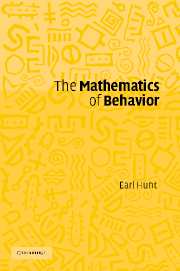Book contents
- Frontmatter
- Contents
- Preface
- 1 INTRODUCTION
- 2 APPLYING PROBABILITY THEORY TO PROBLEMS IN SOCIOLOGY AND PSYCHOLOGY
- 3 FROM PHYSICS TO PERCEPTION
- 4 WHEN SYSTEMS EVOLVE OVER TIME
- 5 NON-LINEAR AND CHAOTIC SYSTEMS
- 6 DEFINING RATIONALITY
- 7 HOW TO EVALUATE EVIDENCE
- 8 MULTIDIMENSIONAL SCALING
- 9 THE MATHEMATICAL MODELS BEHIND PSYCHOLOGICAL TESTING
- 10 HOW TO KNOW YOU ASKED A GOOD QUESTION
- 11 THE CONSTRUCTION OF COMPLEXITY
- 12 CONNECTIONISM
- 13 L'ENVOI
- References
- Index of Names
- Index of Subjects
6 - DEFINING RATIONALITY
personal and group decision making
Published online by Cambridge University Press: 04 May 2010
- Frontmatter
- Contents
- Preface
- 1 INTRODUCTION
- 2 APPLYING PROBABILITY THEORY TO PROBLEMS IN SOCIOLOGY AND PSYCHOLOGY
- 3 FROM PHYSICS TO PERCEPTION
- 4 WHEN SYSTEMS EVOLVE OVER TIME
- 5 NON-LINEAR AND CHAOTIC SYSTEMS
- 6 DEFINING RATIONALITY
- 7 HOW TO EVALUATE EVIDENCE
- 8 MULTIDIMENSIONAL SCALING
- 9 THE MATHEMATICAL MODELS BEHIND PSYCHOLOGICAL TESTING
- 10 HOW TO KNOW YOU ASKED A GOOD QUESTION
- 11 THE CONSTRUCTION OF COMPLEXITY
- 12 CONNECTIONISM
- 13 L'ENVOI
- References
- Index of Names
- Index of Subjects
Summary
AXIOMATIC REASONING
One of my favorite plays is Christopher Fry's 1948 London hit The Lady's Not for Burning. The play takes place in medieval times. A young woman, Jenny Jourdemain, has been accused of being a witch. She then observes some very unusual behavior, including the request of a soldier who wants to be executed because he is weary of life. Jenny, who prides herself on her own logical approach to life, says that she cannot believe that rational people are behaving the way that the people around her are behaving. She is particularly concerned about the magistrates' certainty that she should be burned at the stake. Jenny regards this as illogical, for if she were a witch, she would simply fly away.
People raised in the Western European–North American tradition, and particularly those raised in the more secular branches of that tradition, generally see rational behavior as good and irrational behavior as bad. But who defines rationality? How do we connect rationality to behavior? This chapter will explore these questions, with respect to individual and group decisions.
The approach that will be taken was established by one of the greatest mathematicians of all time, the legendary geometer Euclid of Alexandria (325?–265? b.c.e.), whose work has been studied for more than 2,300 years! Euclid did not invent geometery. Pythagoras preceded Euclid by about 200 years.
- Type
- Chapter
- Information
- The Mathematics of Behavior , pp. 132 - 175Publisher: Cambridge University PressPrint publication year: 2006



